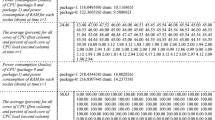Abstract
The high energy consumption of computing platforms has become one of the major problems in high-performance computing (HPC). Computer energy consumption represents a significant percentage of the CO2 emissions that occur each year in the world, therefore, it is crucial to develop energy efficiency techniques in order to reduce the energy consumption in HPC systems. In this work, we present a resource scheduler capable of choosing, using real-time data, the optimal number of processes of running applications. The solution takes advantage of the use the FlexMPI runtime to dynamically reconfigure the application number of processes and DVFS to modify the frequency of cores of the platform. The scheduling algorithms presented in this work include one that minimizes the application energy and another more holistic one that allows the user to balance between energy and execution time minimization. This work presents a description of the methodologies and a experimental evaluation on a real platform.
This work was partially supported by the EuroHPC project “Adaptive multi-tier intelligent data manager for Exascale” under grant 956748 - ADMIRE - H2020-JTI-EuroHPC-2019-1 and by the Agencia Española de Investigación under Grant PCI2021-121966.
Access this chapter
Tax calculation will be finalised at checkout
Purchases are for personal use only
Similar content being viewed by others
References
A carbon crisis looms over supercomputing. how do we stop it?. https://www.hpcwire.com/2021/06/11/a-carbon-crisis-looms-over-supercomputing-how-do-we-stop-it/
Agrawal, P., Rao, S.: Energy-aware scheduling of distributed systems. IEEE Trans. Autom. Sci. Eng. 11(4), 1163–1175 (2014)
Auweter, A., et al.: A case study of energy aware scheduling on SuperMUC. In: Kunkel, J.M., Ludwig, T., Meuer, H.W. (eds.) ISC 2014. LNCS, vol. 8488, pp. 394–409. Springer, Cham (2014). https://doi.org/10.1007/978-3-319-07518-1_25
Chen, J., He, Y., Zhang, Y., Han, P., Du, C.: Energy-aware scheduling for dependent tasks in heterogeneous multiprocessor systems. J. Syst. Architect. 129, 102598 (2022)
Juarez, F., Ejarque, J., Badia, R.M.: Dynamic energy-aware scheduling for parallel task-based application in cloud computing. Futur. Gener. Comput. Syst. 78, 257–271 (2018)
Lin, W., Shi, F., Wu, W., Li, K., Wu, G., Mohammed, A.A.: A taxonomy and survey of power models and power modeling for cloud servers. ACM Comput. Surv. (CSUR) 53, 1–41 (2020). https://doi.org/10.1145/3406208,https://dl.acm.org/doi/10.1145/3406208
Martín, G., Marinescu, M.-C., Singh, D.E., Carretero, J.: FLEX-MPI: an MPI extension for supporting dynamic load balancing on heterogeneous non-dedicated systems. In: Wolf, F., Mohr, B., an Mey, D. (eds.) Euro-Par 2013. LNCS, vol. 8097, pp. 138–149. Springer, Heidelberg (2013). https://doi.org/10.1007/978-3-642-40047-6_16
PROJECT, T.S.: Impact environnemental du numÉrique : Tendances À 5 ans et gouvernance de la 5G (2021). https://theshiftproject.org/wp-content/uploads/2021/03/Note-danalyse-Numerique-et-5G-30-mars-2021.pdf
Schneider, D.: The Exascale era is upon us: the frontier supercomputer may be the first to reach 1,000,000,000,000,000,000 operations per second. IEEE Spectr. 59, 34–35 (2022). https://doi.org/10.1109/MSPEC.2022.9676353
Ábrahám, E., et al.: Preparing HPC applications for Exascale: challenges and recommendations. In: Proceedings - 2015 18th International Conference on Network-Based Information Systems, NBiS 2015, pp. 401–406 (2015). https://doi.org/10.1109/NBIS.2015.61
Author information
Authors and Affiliations
Corresponding author
Editor information
Editors and Affiliations
Rights and permissions
Copyright information
© 2023 The Author(s), under exclusive license to Springer Nature Switzerland AG
About this paper
Cite this paper
Cascajo, A., Arbe, A., Garcia-Blas, J., Carretero, J., Singh, D.E. (2023). Malleable Techniques and Resource Scheduling to Improve Energy Efficiency in Parallel Applications. In: Bienz, A., Weiland, M., Baboulin, M., Kruse, C. (eds) High Performance Computing. ISC High Performance 2023. Lecture Notes in Computer Science, vol 13999. Springer, Cham. https://doi.org/10.1007/978-3-031-40843-4_2
Download citation
DOI: https://doi.org/10.1007/978-3-031-40843-4_2
Published:
Publisher Name: Springer, Cham
Print ISBN: 978-3-031-40842-7
Online ISBN: 978-3-031-40843-4
eBook Packages: Computer ScienceComputer Science (R0)




